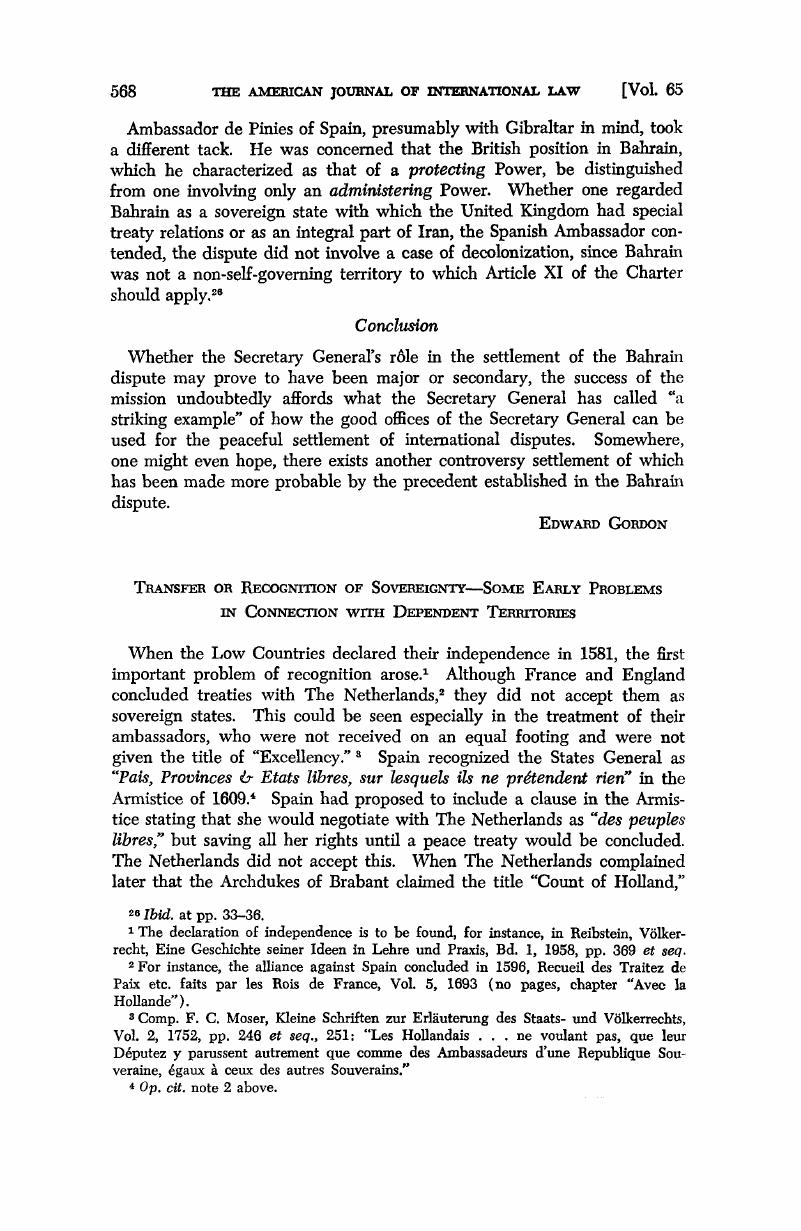Published online by Cambridge University Press: 28 March 2017

1 The declaration of independence is to be found, for instance, in Reibstein, Völkerrecht, Eine Geschichte seiner Ideen in Lehre und Praxis, Bd. 1, 1958, pp. 369 et seq.
2 For instance, the alliance against Spain concluded in 1596, Recueil des Traitez de Paix etc. faits par les Rois de France, Vol. 5, 1693 (no pages, chapter “Avec la Hollande“).
3 Comp. F. C. Moser, Kleine Schriften zur Erläuterung des Staats- und Völkerrechts, Vol. 2, 1752, pp. 246 et seq., 251: “Les Hollandais … ne voulant pas, que leur Députez y parussent autrement que comme des Ambassadeurs d'une Republique Souveraine, égaux à ceux des autres Souverains.“
4 Op. cit. note 2 above.
5 Comp. Histoire des Traitez de Palx et autres Negociations du dix-sèptieme Siecle, Vol. 2, 1725, pp. 60, 63.
6 Art. I of the treaty of Jan. 30, 1648, states: “Premierement declare ledit Seigneur Roi & reconnait que lesdites Seigneurs Etats Generaux des Pays-Bas Unis … sont libres & Souverains Etats … sur lesquels le dit Seigneur Roy ne pretend rien.” SchmauB, Corpus Juris Gentium Academicum … Vol. 1, 1730, p. 615.
7 F. C. Moser, he. cit., pp. 256 et seq.
8 The Confederacy had concluded treaties with many European Powers; for the treaties with France comp. Recueil, note 2 above. For the quality of subjects of international law held by the states of the Holy Roman Empire, Knubben, Die Subjekte des Völkerrechts, p. 63 (1928).
9 J. J. Moser, Die gerettete völlige Souverainete der löblichen Schweitzerischen Eydgenossenschaft, 1731, (with official correspondence). The Reichskammergericht was the highest court of the Holy Roman Empire, having jurisdiction inter alia to review acts of the Princes to determine their conformity with imperial laws.
10 The wording of Art. VI of the Treaty of Osnabrück and §61 of the Treaty of Minister was that the Swiss cantons are “in possessione vel quasi plenae libertatis et exEmptiohis ab Imperio.” Zeumer, Quellensammlung zur Geschichte der Deutschen Reichsverfassung in Mittelalter und Neuzeit, pp. 415, 437 (2nd ed., 1913). For the possible interpretations, J. J. Moser, loc. cit., pp. 22 et seq.
11 J . J. Moser, he. cit., p. 28; Vattel, Le Droit des Gens, Vol. 1, §202 (Edition Paris, 1838, p. 219).
12 J. J. Moser, he. cit., p. 49, where it is stated that Schurzfleisch was of this opinion.
13 Loc. cit., p. 49; ”… da wir … gehöret … daB die Eydgenossen ihre Souverainete’ niemand als sich selbsten haben wollen zu dancken haben und daB sie von dem Reich nichts weiters verlangt, als sie dafür zu erkennen, wer sie schon so lange Zeit seyn.“
14 Comp. Fawcett, The British Commonwealth in International Law 92 et seq. (1963), and Wheare, The Constitutional Structure of the Commonwealth 89 et seq. (I960).
15 Treaties with France, The Netherlands, Sweden and England of 1641 and 1642 will be found in Colleçgao dos Tratados, Convençoes, Contratos (issued by Portugal), Vol. 1 (1856), pp. 16, 24, 50, 82; Histoire des Traitez de Paix et autres Negotiations du dix-septieme Siècle etc., Vol. 2 (1725), pp. 573 et seq.
16 Loc. cit., pp. 575 et seq.: “II parait que ce Traité ne mettait point le Royaume de Portugal en une sureté entière de son état, puisque le Roi d'Espagne n'y renonçait point formellement aux droits & prétentions qu'il avait sur cette couronne, ainsi qu'on a accoutumé de faire en ces rencontres.“
17 Charles de Martens, Causes célèbres du droit des gens, Vol. 3 (2* éd., 1859).
18 J. C. W. von Steck, “Versuch von Erkennung der Unabhängigkeit einer Nation und eines Staates,” in Versuche über verschiedene Materien politischer und rechtlicher Kenntnisse, pp. 49-56 (1783).
19 Loc.tit., pp. 54 et seq.; in connection with von Steck compare Alexandrovicz, “The Theory of Recognition in fieri,” 34 Brit. Yr. Bk. Int. Law 176, 180 et seq. (1958).
20 J. J. Moser, Beyträge zu dem neuesten Europäischen Völkerrecht in Fridens-Zeiten (1778), 1. Buch, I § 4 ,16 et seq.
21 Schmalz, Das europäische Völkerrecht, p. 37 et seq. (1817); G. F. de Martens, Précis du Droit des Gens §80 (3rd ed., 1820) (p. 221 et seq. of the edition of 1864); Kliiber, Europäisches Völkerrecht, Vol. 1, §23, p. 49 et seq. (1821); Saalfeld, Handbuch des positiven Völkerrechts, p. 63 et seq. (1833).
22 Comp. 3 Moore, International Adjudications, Modern Series, 2, 244, 251 et seq.
23 1 Smith, Great Britain and the Law of Nations 151 et seq. (1932).